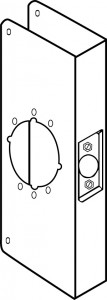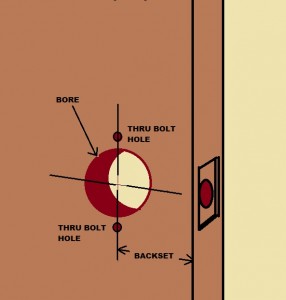 A wrap-around door reinforcer is a metal sleeve that slides over the door at the lock prep to conceal damage and/or reinforce the door. They are a quick and handy solution when wood doors are damaged by forced entry and are often installed to strengthen new wooden doors against forced entry attempts.
A wrap-around door reinforcer is a metal sleeve that slides over the door at the lock prep to conceal damage and/or reinforce the door. They are a quick and handy solution when wood doors are damaged by forced entry and are often installed to strengthen new wooden doors against forced entry attempts.
In my experience a wrap does not really deter forced entry, but it does limit the damage done to the door. I have found that when wood doors equipped with wrap around door reinforcers are burglarized, often only the wrap and the lock need replacing, not the whole door. As with all door security hardware, if your lock is installed in a wrap-around door reinforcer and your neighbor’s lock is not, a would-be burglar may choose to break into your neighbor’s place instead of yours; however, this hypothesis is dependent on the highly dubious notion that a burglar is behaving rationally. If the person were behaving rationally they would not risk their freedom and personal safety breaking into to somebody’s home to steal their iPad or PC and selling it for chump change to their drug dealer.
Another benefit to using wrap-arounds is that they can act as a drill guide for lock installation. Be careful, however, not to let the hole saw chew up the wrap. Also, especially with stainless steel wraps, be sure not to let your drill bind up with the metal at high speed. Injury would be likely.
Wraps are typically used on wooden doors, and while it is possible to use them on hollow metal doors, they never seem to fit quite right without a fight. It seems that hollow metal doors measure exactly 1-3/4 inches thick whereas wood doors tend to measure closer to 1-11/16 inches. Variations in door thickness affect the way a wrap will fit (or not fit) on a door.
A wide variety of wrap-arounds have been created to accommodate various locks and conditions. Don Jo Manufacturing currently carries the largest assortment, and if a new kind of lock by a major manufacturer emerges, they are pretty quick to design a wrap for it. To get the right  wrap for your application you need to know:
wrap for your application you need to know:
- Door thickness
- Size of the wrap you want
- Diameter of the lock bore
- Backset
- Finish
- Through-bolt holes (yes or no)
(see illustration)
Standard door thicknesses for wraps are 1-3/8 inches and 1-3/4 inches. Some models of wraps are available thicker doors. Wraps come in a variety of heights, but height is usually determined by the kind of lock the wrap is designed for and the backset. See the illustration for bore, through-bolt hole and backset details.
For other wraps you may need other dimensions. For example, Don Jo makes a number of wrap-arounds for interconnected locks and these (naturally) have two bores cut in instead of one. If you need a wrap for a mortise lock you may have to change the trim on the lock to make it work, or you might have to drill lever, cylinder and thumb turn holes into a blank wrap to customize it to the lock you have. See my warning about hole saws and stainless steel above. I earned myself sprained fingers that way once.
I used to joke about certain doors that they could use a door sized wrap. Then some enterprising individual actually brought one by. The idea didn’t go anywhere, as far as I know, but it was a good concept: one wrap covered the door completely in sheet metal and another covered the frame. Still, at that point why would one just buy a hollow metal door and frame?
And that about wraps it up.
builders hardware, cylindrical lock, door hardware, lock problem, lock repair, lock retrofit, retrofit, security hardware

{ Comments are closed! }